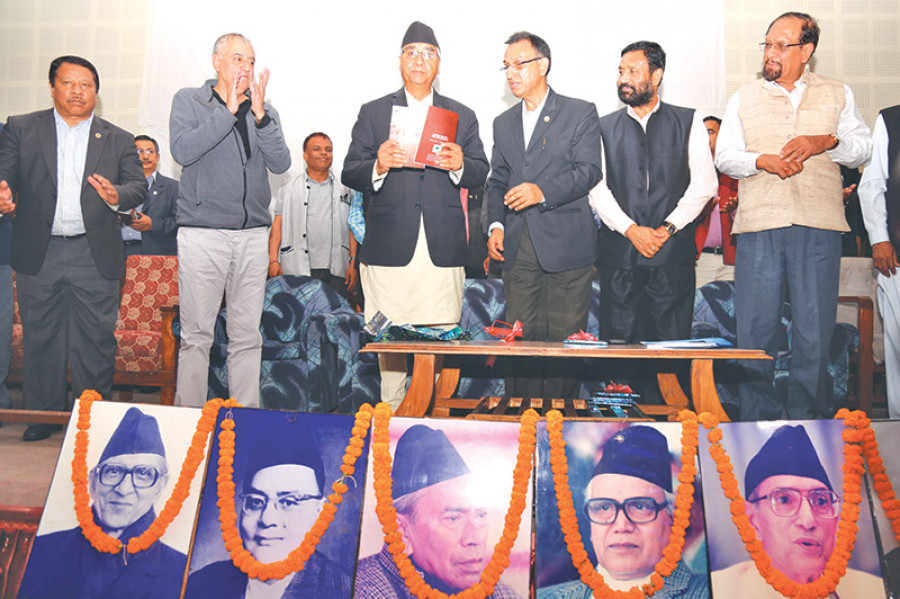Columns
Generational idiosyncrasy of Nepali Congress
To be relevant again, the party must flush out the toxic residues of Machiavellian politicking from its culture.
Sucheta Pyakuryal
Long ago, it was theorised that men are insecure creatures, and that fear in men is as innate as their will to prevail. While skimming through the basics of Western political philosophy, I have often wondered whether one can apply the theses of Niccolò Machiavelli and Thomas Hobbes to women too; in my experience, women rarely seem to feel the kind of power-centric insecurities political men do. Maybe it is because women were seldom allowed into political games, where the stakes were too high and therefore the will to prevail and the fear of the failure to do so did not get channelled into the female DNA as much. It is not uncommon, then, that the Nepali Congress, the grand old party of Nepal, which has forever been predominantly male, grapples with this intrinsically masculine fear that is intertwined with the will to prevail, that has become part and parcel of its organisational culture, and fraternity.
Famous organisational management guru Peter Drucker once said, “Organisational culture eats organisational strategy for breakfast.” Never has this been truer than in the case of the NC. Regardless of the vigorously democratic manifestoes it has produced over the years, the NC remains painfully archaic because of its overwhelmingly male composition and Machiavellian culture of power-mongering and insecurity it has fostered over the years.
Among the first generation Kangressi men, the fraternal insecurities surfaced first between the half-brothers, Matrika Prasad (MP) Koirala and Bisheshwar Prasad (BP) Koirala. After BP parted ways with MP, the second surge of insecurities surfaced, and this time it was between BP and another well-loved leader of the party, Surya Prasad (SP) Upadhyaya. BP and Upadhyaya both attracted young political-minded Nepali men of the time, and both had contributed to the Indian freedom movement. BP was supposedly close to Jayaprakash Narayan and Dr Rajendra Prasad, and SP to Jawaharlal Nehru. It was perhaps SP’s proximity to Nehru and later with Nehru’s daughter Indira Gandhi that fueled the insecurities within the “BP faction”. In addition to being a friend of an important Indian statesman, SP was also an avid reader and an impressive orator. There is an oft-quoted account of how SP almost got arrested during the Rana regime for owning Harold Laski’s A Grammar of Politics. Stories about SP’s well-stocked library and his generosity, especially towards young democratic minded students studying in Kathmandu, still get told and retold.
Perhaps due to SP's political suaveness, a narrative created early on inside the NC presented him as being too “pro-Indian”, an unfair label that stuck to him all his life. This narrative not only helped BP cement his position as the uncontested leader of the NC but also gave birth to propaganda politics and groupism within the party, ultimately damaging its cohesion. Two powerful factions emerged: The Koirala faction and the Subarna Shumsher-SP faction, with the former proving over time to be more influential than the latter.
The NC reemerged as a formidable political force in 1990, heralding the second wave of insecurities and power wrangling among party men. Krishna Prasad Bhattarai was perceived as one of the big five stalwarts of the party. However, Girija Prasad Koirala, BP’s younger brother and the successor of the Koirala clan, was gearing up for the leadership mantle. Suddenly, the old factionalism reemerged: Ganeshman Singh resigned from active politics, and the Koirala faction managed to brandish Bhattarai as a weaker alternative to GP Koirala. The new group that emerged and replaced the old SP-Subarna faction to be pitted against the Koirala faction was named the “Kisunji faction.” After Bhattarai’s death, this faction morphed into “Deuba faction”. Thirty years of organisational politics within the NC has been fraught with insecurities of powerful party men that lead to factional realpolitik.
This factionalism had, in recent days, become intergenerational, where younger men like Gagan Thapa and Bishwa Prakash Sharma were challenging the old party men. Although still exclusively male-centric in this age of (in)equality, this intergenerational strife was perceived as a start of a much-needed change within the NC. However, a recent realpolitik that unfolded within the party reasserted the fact that the residual Machiavellianism is, in essence, a quintessential Kangressi culture.
In March, Swarnim Wagle left the NC when the party implicitly agreed to give him the ticket in Chitwan-2 against Rabi Lamichhane. This would have been a political suicide even a naïve politician would want to avoid. Wagle, an internationally trained economist who had not had a chance to get fully immersed into the Kangressi culture, initially failed to see that the game theory, a common strategy used in economics, was being applied in his own case. The next generation of leaders, Gagan Thapa and Shekhar Koirala, who were close to Wagle, are themselves vying for the prime ministerial berth. Wagle’s entry into active politics would give them an added competition. Why would they, or any prospective Kangressi pave an easy path for Wagle, a threat and a competition in every possible way, to enter active politics?
Today, nepotism and the system of spoils used by NC president Sher Bahadur Deuba and his coterie has added another layer to the already toxic intra-party politics. The hegemony of the Deuba faction has proved to be an insurmountable hurdle for the next generation of political men such as Gagan Thapa, Bishwa Prakash Sharma and Shekhar Koirala. Pitting a powerful expert newbie like Wagle and the Deuba faction against each other made sense to them. Anyone who has lived in the periphery of the NC long enough knows how narratives are created and how the factional spin doctors use these narratives to drive a wedge inside the party.
Injecting insecurities inside the unscrupulous and insecure Deuba faction against Swarnim Wagle on one end and encouraging grievances among those sympathetic to Wagle against Deuba and his spouse for denying a ticket on the other, created a win-win situation until Wagle left the party and became a bigger existential threat to this generation of political men. Swarnim Wagle’s unexpected exit set off a surge of insecurity that was explicitly showcased in bitter and almost desperate speeches delivered in Chitwan and Tanahun.
They say that organisational culture gets manifested through shared mindset, values, and behaviours; get amplified and exemplified by the words and deeds of leaders; get actuated through organisational practices and processes; and is visible in all relationships, rituals, narratives, and daily practices. For today’s voters, especially those educated in the urban areas who are less gendered and prefer a more egalitarian culture, the NC exudes an outdated masculine hierarchy and paternalism and is increasingly being seen as a corroding monolith that is not in sync with modern-day socio-political values. To be relevant again, the party must flush out the toxic residues of the old Machiavellian politicking from its organisational culture.




 8.26°C Kathmandu
8.26°C Kathmandu















